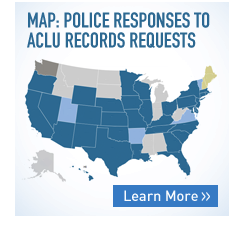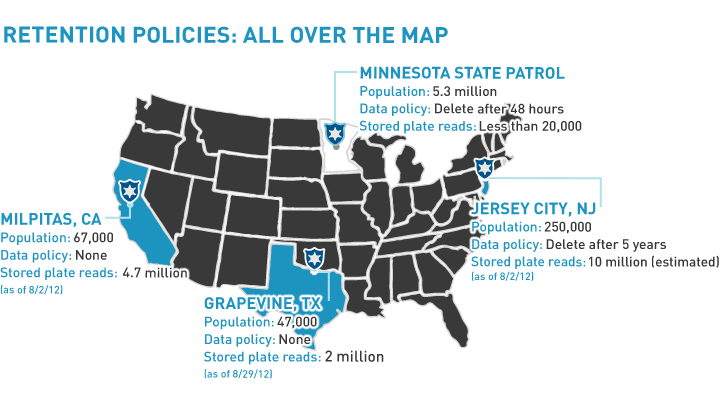

Privacy statement. This embed will serve content from newsbound.com.
A little noticed surveillance technology, designed to track the movements of every passing driver, is fast proliferating on America’s streets. Automatic license plate readers, mounted on police cars or on objects like road signs and bridges, use small, high-speed cameras to photograph thousands of plates per minute.
The information captured by the readers – including the license plate number, and the date, time, and location of every scan – is being collected and sometimes pooled into regional sharing systems. As a result, enormous databases of innocent motorists’ location information are growing rapidly. This information is often retained for years or even indefinitely, with few or no restrictions to protect privacy rights.
Read the report: You Are Being Tracked
In July 2012, ACLU affiliates in 38 states and Washington sent public records act requests to almost 600 local and state police departments, as well as other state and
federal agencies, to obtain information on how these agencies use license plate readers. In response, we received 26,000 pages of documents detailing the use of the technology around the country. Click on the map icon on the right to learn how police in your state use license plate readers to track people's movements.
The documents paint a startling picture of a technology deployed with too few rules that is becoming a tool for mass routine location tracking and surveillance. License plate readers can serve a legitimate law enforcement purpose when they alert police to the location of a car associated with a criminal investigation. But such instances account for a tiny fraction of license plate scans, and too many police departments are storing millions of records about innocent drivers. Moreover, private companies are also using license plate readers and sharing the information they collect with police with little or no oversight or privacy protections. A lack of regulation means that policies governing how long our location data is kept vary widely.
Automatic license plate readers have the potential to create permanent records of virtually everywhere any of us has driven, radically transforming the consequences of leaving home to pursue private life, and opening up many opportunities for abuse. The tracking of people’s location constitutes a significant invasion of privacy, which can reveal many things about their lives, such as what friends, doctors, protests, political events, or churches a person may visit.
In our society, it is a core principle that the government does not invade people’s privacy and collect information about citizens’ innocent activities just in case they do something wrong. Clear regulations must be put in place to keep the government from tracking our movements on a massive scale.
As the technology spreads, the ACLU calls for the adoption of legislation and law enforcement agency policies adhering to the following principles:
- License plate readers may be used by law enforcement agencies only to investigate hits and in other circumstances in which law enforcement agents reasonably believe that the plate data are relevant to an ongoing criminal investigation.
- The government must not store data about innocent people for any lengthy period. Unless plate data has been flagged, retention periods should be measured in days or weeks, not months and certainly not years.
- People should be able to find out if plate data of vehicles registered to them are contained in a law enforcement agency’s database.
- Law enforcement agencies should not share license plate reader data with third parties that do not follow proper retention and access principles. They should also be transparent regarding with whom they share license plate reader data.
- Any entity that uses license plate readers should be required to report its usage publicly on at least an annual basis.
This report was cross-posted from ACLU National

